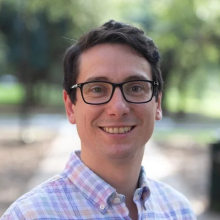EECS Seminar: Mixed Conductors for Bioelectronics

Abstract: Electrical interfacing with the nervous system is transforming how neurological disorders are monitored and treated, offering new possibilities for neuromodulation and diagnostics. However, a fundamental challenge remains: bioelectrical signals are carried by ions, whereas conventional electrodes rely on electron transport, resulting in significant inefficiencies in signal transduction. In this talk, I will introduce soft, biocompatible, mixed ionic-electronic conducting conjugated polymers designed to bridge this gap. These organic materials enable high charge injection capacity, allowing for the delivery of electric fields at low frequencies. I will first discuss how we can leverage optical spectroscopy to understand ionic and electronic charge transport in this class of materials. I will then show how optimizing electrode processing enhances electrode stability and performance for chronic electrophysiology applications. Finally, I will present how conducting polymers can be leveraged to amplify artificial receptors, enabling the development of miniaturized, implantable biosensors for real-time, spatially resolved chemical sensing. These technologies have the potential to improve the precision and durability of neural interfaces, opening new frontiers in brain-machine interfaces.
Bio: Scott Keene received his B.S. in materials science and engineering from the University of Washington in 2015. In 2020, he received his Ph.D. in materials science and engineering from Stanford University, where he worked in Professor Alberto Salleo’s group as a Stanford Graduate Fellow, developing biosensors and neuromorphic devices. He then received a Marie Curie Fellowship to study organic mixed ionic-electronic conductors at the University of Cambridge, working in the Departments of Electrical Engineering and Physics under the supervision of George Malliaras and Akshay Rao. In 2024, he joined Rice University as an assistant professor in materials science and nanoengineering as well as a core member of the Neuroengineering Initiative. His current research focuses on creating innovative materials and devices for monitoring and manipulating neural activity.
Share
Upcoming Events
-
EECS Seminar: Steering Diffusion Models for Generative AI, From Multimodal Priors to Test-Time Scaling
-
MAE 298 SEMINAR: Hypersonic Viscous Aerothermochemistry - External Aerothermodynamics and Scramjet Fuel-Air Mixing
-
CBE 298 Seminar: Finding Catalysts of Gut Reactions - The Gut Microbiota in Disease Onset and Treatment
-
CEE Seminar: Confirming a Critical Foundation of Global Warming - Direct Observational Evidence from Space of the Impact of CO2 Growth on Infrared Spectra
-
CBE 298 Seminar: Teaching Transport Phenomena Through Observation - From Einstein’s Tea Leaves to Dissolving Skittles
